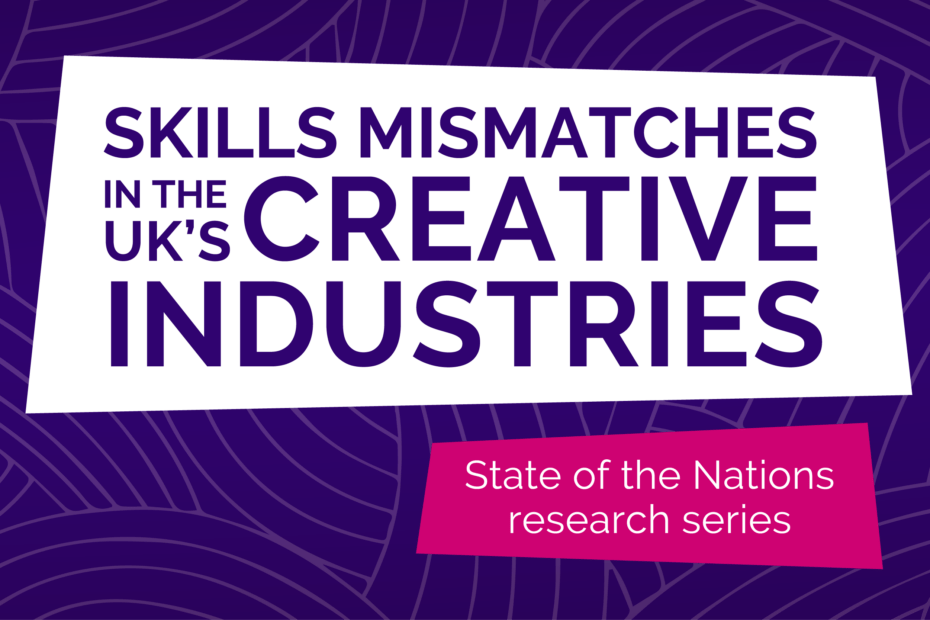A Creative PEC State of the Nations Report
The rapid growth of the UK’s creative industries has earned them a place in the UK government’s Industrial Strategy as a priority sector. Yet the education and skills system has not been supported to keep pace. This has led to a widening gap between the skills the workforce has and what employers say they need. This is the key finding of a new report ‘Skills Mismatches in the UK’s creative industries’ published today by the Creative Industries Policy and Evidence Centre (Creative PEC) as part of their flagship ‘State of the Nations’ series.
The report presents new evidence from official sources of labour market information (LMI) and examines employers’ perspectives on the picture and patterns of skills mismatches in the sector. It provides an important foundation for a more detailed ‘skills audit’ that the Creative PEC will launch later this month, examining in greater depth the skills the creative industries need to achieve their future growth potential. A core intention of the report is to provide valuable insight to inform Skills England’s forthcoming skills assessment for the creative industries and to help direct investment and provision for the creative sector as part of developing the Creative Industries Sector Plan aligned to the government’s new Industrial Strategy, Invest 2035.
Heather Carey, Co-Director of Work Advance, who produced the report for the Creative PEC says:
“Skills deficiencies are stymieing innovation in the UK’s creative industries. As AI, wider technological advancement and other global megatrends drive continual change in the knowledge, skills and competencies required in the workplace, there is a need for the skills system to be more agile and responsive to industry skills needs. This must go hand-in-hand with sufficient investment by creative employers and workers in upskilling and reskilling, to ensure workforce skills remain relevant, now and in the future.”
Key report findings include:
- 65% of ‘hard-to-fill’ vacancies in the creative industries are attributable to skills shortages, compared with just 41% of ‘hard-to-fill’ vacancies across all sectors.
- Skills shortages are most pronounced for higher-skilled roles, with 78% of creative industries employers experiencing such deficiencies (in the three highest occupations), compared with 31% across all industries.
- Creative industries employers are more likely to report having to delay developing new products or services because of the skills shortages they face.
- Skills gaps among the existing creative industries workforce are on the rise, as the sector struggles to get to grips with rapid technological advancement and innovation. In 2022, nearly 60,000 creative industries workers were not fully proficient for their roles – an increase of 15,000 workers since 2017.
- Skills gaps caused by the introduction of new technology (including but not limited to AI) and the development of new products and services are a particular challenge for creative businesses.
Professor Hasan Bakhshi, Director, Creative PEC says:
“The creative industries, a priority growth sector for the government, are not alone in having a skills mismatch, reflecting the wider challenges in UK education and skills, but disproportionate numbers of the sector’s ‘hard-to-fill vacancies’ are attributable to a skills shortage. We need nothing less than a system change across UK schools, technical education, universities, continuous professional development and careers pathways to enable the creative economy to realise its growth potential.” The report is the latest in the Creative PEC’s State of the Nations series which is designed to provide robust data and evidence to inform policy to support the creative industries.”
The Creative PEC is led by Newcastle University with the Royal Society of Arts (RSA) and funded by the Arts and Humanities Research Council (AHRC).
State of the Nations
The Creative PEC’s ‘State of the Nations’ series analyses the latest data across four thematic areas to inform the development of policies relating to the creative industries. Their scope is the whole of the United Kingdom, and wherever possible data is presented for all the nations and regions. Regular reports on each area will be published biannually over the five yours of the Arts and Humanities Research Council (AHRC) funding. The themes and corresponding Research Consortium Partners are:
R&D, Innovation and Clusters (University of Sussex)
Internationalisation (Newcastle University)
Arts, Culture and Heritage (University of Sheffield)
Education, Skills and Talents (Work Advance)
The report is written by our consortium partners at Work Advance:
Heather Carey, Director of Work Advance
Lesley Giles, Director of Work Advance
Professor Dave O’Brien, Professor of Cultural and Creative Industries at The School of Arts, Languages and Cultures, University of Manchester
Citation: If the information in this report is used in any subsequent research and/or publications, please cite as follows: Giles, L., Carey, H. and O’Brien, D. (2025) ‘Skills Mismatches in the UK’s Creative Industries’. Creative PEC State of the Nations Research Series. doi: 10.5281/zenodo.14733687. ISBN: 978-0-7017-0283-0.
The report was designed by Mike Green at Green Doe Ltd.
